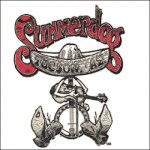The revival of Chip Robinson, backslider
In the shadows of memory I remain convinced that once I saw the Backsliders, of Raleigh, North Carolina, perform. This is probably not true, because generally I associate such things with specific venues and other oddments. In my memory, they were on the fateful bill with Whiskeytown at SXSW, that first year, must’ve been 1996. Only my contact sheet says Whiskeytown played with the Waco Brothers and the Bottle Rockets, and I can think of no other occasion on which I might have seen the Backsliders.
Which is a pity. David Menconi always said they were a formidable band, when they were right. And he’s seen more music than I have, though he’s also a good bit kinder than I am. When I asked what happened to a once-promising band who recorded good albums which hinted at greatness for Mammoth, people who knew would make faces and noises and not spill words into the mess. And so I was left to guess, and to forget, except that I think “Hey Sheriff” is one of the great forgotten classics of the ’90s, regardless genre.
Not more than a few days after mentioning here, in passing, that I’d been sent another album by a band calling themselves the BAcksliders [sic] who were not Chip Robinson’s Backsliders, Mr. Robinson’s solo debut titled Mylow arrived in the mail. And I recalled all those murmered and dark silences which followed his name, except that the first thing one notices is that he’s been joined by a veritable Gray Team of roots rock survivors (producer Eric Ambel, bassist Keith Christopher, Greg Rice on organ, etc.), a kind of Brooklyn-based summit which suggests a future and forgiveness.
And so.
The opening track is titled “Preface.” It is plain and industrial and harsh, Robinson’s words mostly spoken — and I am reminded, not for the first time on Mylow, how much his voice now reminds me of Mark Lanegan, with whom he shares certain appetites, best I can tell. Shared. It is a simple, calm, brave song, cataloging all the things which could not kill him, which include drink, drugs, and cancer. Having spent some time around 12-steppers, I am tempted to note that he has inverted his sentence structure, and that these are simply ways in which he apparently tried to kill himself, and failed, but no matter. No matter, it is a brave and bold song, open and honest and direct, and musically far adrift from his roots.
It is, for better and for worse, unlike anything else released on Mylow, which I take to be the spelling of a son he is no longer able to see, though it is not clear from the songs (nor is it any of my business) why that should be.
It is necessary to pause here for a moment of introspection. Why is it, one types, hesitantly, that we are more drawn to songs of dissipation and destruction than we are to the anchors of recovery and adult love. Since it is my question, I’ll take a stab at answering it. I think that the latter is harder to do well. That it requires greater subtlty, a different kind of craft. That the words which get you through the night do not necessarily translate to others. These are guesses, but I am troubled by the question.
Mylow downshifts from its “Preface” to the acoustic “Wings,” and, again, I am reminded in many ways of Lanegan, who was not my friend but with whom I shared several engaging, stimulating, challenging conversations; for whom I have deep respect, and great fear. “If you’re folding/then go ahead/you’re folding./And if you’re holding/you best be holding on,” he sings, and anyway he means it it’s a formidable bit of writing. “Beesting” returns to rock guitars, but I am wary from the line “She raised me up like Lazarus” and troubled by the issues raised in the previous paragraph. My guess is that this is a song about the women who rescued him from himself, but it reminds me too much of the obligatory song-to-the-wife many musicians find it necessary or desirable to bury somewhere on their albums. And I don’t like power ballads, so it’s probably my fault.
“Fence” reminds me a bit of Steve Earle, with whom Ambel plays (or played?), partly because Robinson’s lines have taken on the same short, breathy quality that Earle writes with much of the time these days. Again, it’s a squishy love song (though I like the line “it took the wind from a thousand blackbirds’ wings/to blow me me straight…”), and I find myself waiting for the music to flex its power again.
It does, for a time, with “Mylow” (a rocker) and “Mylow Dreams” (its acoustic mate). The second half of the album, demarcated with a cover of Ronnie Lane’s “Kutschy Rye”), is less…certain. Something. I won’t do any more of this song-by-song silliness, save for noting that “Closer to the Light” reminds me too much of Clapton’s “Wonderful Tonight.” (So does “A Prayer Please,” maybe more so.) Not that Robinson is copping from Clapton, just that in both cases I respect the rocker and rue the balladeer. These are my prejudices as a listener.
At some point this becomes a confessional album about people I don’t know, sort of like tuning into a movie on the Oxygen channel when the women-folk aren’t home, and spending more time watching than the commercials in the ballgame would give license. Or it’s all artifice, but I don’t hear that in Robinson’s voice, and I don’t think his mates would’ve come together for that.
Here’s my hope: My hope is that Chip Robinson is finding is way, and will keep doing so. My hope is that his muse will wander from these tender places, that he will heal enough to look outside of himself into the world, and then drag himself all the way back into that world. The way forward may be the final song, “Wishin on the Cars.” My hope is that he will make other records and they won’t cost so much, and that they will find a broader audience.
Regardless, I am grateful once again to hear his voice. As, I suspect, is his family.




